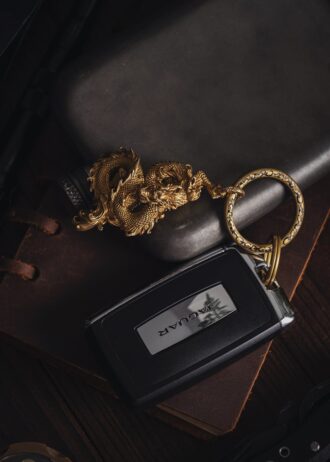Introduction: Navigating the World of Water-Resistant Jewelry
Whether you’re an avid swimmer, enjoy beach days, or simply don’t want to worry about your jewelry when you shower, understanding what’s truly safe for water exposure is essential. In today’s eco-conscious and active lifestyle, waterproof jewelry is more than a trend—it’s a necessity. This guide delves into the differences between water-resistant and waterproof jewelry, examines the safety of showering with gold, and highlights innovative waterproof jewelry brands that are designed to withstand the elements without compromising style.
Understanding Waterproof vs. Water-Resistant Jewelry
What Does “Waterproof” Really Mean?
In the world of jewelry, the terms “waterproof” and “water-resistant” are often used interchangeably, but they are not the same. True waterproof jewelry is designed to withstand prolonged exposure to water, including swimming, showering, and even saltwater without deteriorating. On the other hand, water-resistant jewelry may resist brief contact with water but can be damaged by chemicals, chlorine, or extended immersion.
Key Materials and Their Response to Water
Different materials respond uniquely to water exposure:
- Precious Metals: Solid gold, platinum, and titanium are inherently water-resistant. However, gold-plated pieces may wear off over time due to the thin layer of gold on a base metal.
- Gemstones: Many natural gemstones are durable and safe for water, but porous stones (like opal or turquoise) can be damaged by prolonged water exposure.
- Platings and Finishes: High-quality plating techniques can enhance water resistance. Look for jewelry that uses advanced plating technology to ensure long-lasting shine.
Understanding these properties will help you make informed decisions about which pieces to wear in wet conditions.
Can I Shower with Gold Jewelry?
Pure Gold vs. Gold-Plated Jewelry
When it comes to gold, the purity and construction matter:
- Solid Gold: Solid 14k, 18k, or 24k gold jewelry is highly resistant to water, making it safe to wear in the shower and even while swimming. Its non-reactive nature means it won’t tarnish or corrode easily.
- Gold-Plated Jewelry: These pieces are created by coating a base metal (such as brass or copper) with a thin layer of gold. Although they offer the look of gold at a lower price, prolonged exposure to water, especially chlorinated or saltwater, can gradually wear away the plating. This means that while occasional exposure is usually fine, daily showers or swims might shorten the lifespan of your gold-plated items.
Best Practices for Caring for Gold Jewelry in Water
If you love your gold jewelry but worry about water exposure, consider the following tips:
- Avoid soaking gold-plated pieces in water for long periods.
- Rinse your jewelry with clean water after swimming to remove chlorine or salt.
- Dry your jewelry thoroughly with a soft cloth to prevent water spots and oxidation.
- For daily wear, opt for solid gold or high-quality, thick gold plating to ensure durability.
Top Waterproof Jewelry Brands: Safe and Stylish for Water Lovers
Innovative Brands Leading the Way
Several jewelry brands are pioneering waterproof and water-resistant designs that combine aesthetic appeal with durability. These brands focus on sustainable, ethical production methods while ensuring their products withstand the rigors of an active lifestyle.
Featured Waterproof Jewelry Brands
| Brand | Materials & Techniques | Notable Features |
|---|---|---|
| Atolea Jewelry | Recycled metals, robust plating | Waterproof designs with lifetime color warranty; ideal for everyday wear and active lifestyles |
| Purely Precious | Solid gold and platinum | Luxury pieces that are completely water-resistant, suitable for swimming and showering |
| EcoGem Designs | Reclaimed materials, eco-friendly processes | Innovative, sustainable jewelry with water-resistant packaging and production methods |
| Green Glamour | Ethically sourced metals with advanced plating technology | High durability and eco-conscious packaging ensure long-lasting beauty even with water exposure |
| Marine Luxe | Waterproof polymers, anodized titanium | Designed specifically for water sports and active lifestyles, offering a modern, sleek look |
Practical Tips for Caring for Waterproof Jewelry
Daily Maintenance and Cleaning
Even waterproof jewelry benefits from regular cleaning to maintain its shine and structural integrity. Here are some actionable tips:
- Rinse After Exposure: Always rinse your jewelry in fresh water after swimming in pools, the ocean, or lakes to remove chlorine and salt.
- Use Mild Cleaners: Clean your pieces with a solution of mild dish soap and warm water. Avoid harsh chemicals that could damage the jewelry’s finish.
- Dry Properly: Pat your jewelry dry with a soft, lint-free cloth. Air drying is ideal but ensure it is completely dry before storing.
- Store Carefully: Keep your jewelry in individual pouches or a lined jewelry box to prevent scratches and unwanted chemical reactions between different pieces.
Waterproof Jewelry Care Checklist
- ✔ Rinse thoroughly with fresh water after swimming
- ✔ Use a gentle, mild soap for cleaning
- ✔ Dry completely with a soft cloth
- ✔ Store in a separate, soft-lined compartment
- ✔ Avoid prolonged exposure to chemicals (e.g., chlorine, saltwater, lotions)
Frequently Asked Questions (FAQ)
Is It Really Safe to Wear Waterproof Jewelry in the Pool?
Yes, high-quality waterproof jewelry—especially those made from solid precious metals or with advanced plating—can typically withstand swimming. However, it’s important to rinse your jewelry after exposure to chlorinated or saltwater to maintain its finish.
Can I Shower with Gold Jewelry?
Solid gold jewelry is generally safe for daily showering. However, gold-plated items may fade over time if exposed to water, soaps, and shampoos on a regular basis. If you prefer gold-plated jewelry, remove it before showering and opt for cleaning it gently afterward.
What Should I Look for in Waterproof Jewelry?
When choosing waterproof jewelry, look for:
- High-quality materials such as solid gold, platinum, titanium, or high-grade stainless steel
- Advanced plating techniques that ensure durability and resistance to water
- Eco-friendly and sustainable production practices
- Positive reviews regarding its performance in water exposure
Internal Resources and Further Reading
For more in-depth advice on jewelry care and sustainable practices, check out our other guides:
- Jewelry Care & Maintenance – Detailed tips on cleaning, storage, and routine care.
- Ethical Jewelry Sustainability – Learn how brands are embracing eco-friendly production.
- Gemstone Lore & Science – Explore the fascinating stories behind your favorite gems.
- Jewelry Education & Buying Guides – Get expert advice on selecting and caring for jewelry.
- Vintage & Antique Jewelry – Discover timeless pieces that have stood the test of time.
Conclusion: Dive into a World of Durable, Stylish Jewelry
Waterproof jewelry is an excellent investment for anyone who lives an active lifestyle or simply wants peace of mind while swimming, showering, or enjoying water sports. By understanding the differences between solid and plated gold, recognizing the importance of high-quality materials, and following proper care routines, you can ensure your jewelry remains as brilliant as ever—even after repeated exposure to water.
“Invest in jewelry that’s as resilient as your lifestyle. With proper care and the right materials, waterproof jewelry lets you enjoy life’s adventures without compromising on style or sustainability.” – Jewelry Care Expert
Whether you’re splashing in the pool or catching waves at the beach, choose accessories that not only enhance your style but also stand up to your active, water-filled lifestyle. Embrace the convenience of waterproof jewelry and dive into a world where beauty meets durability—protecting your investment and the environment at the same time.






